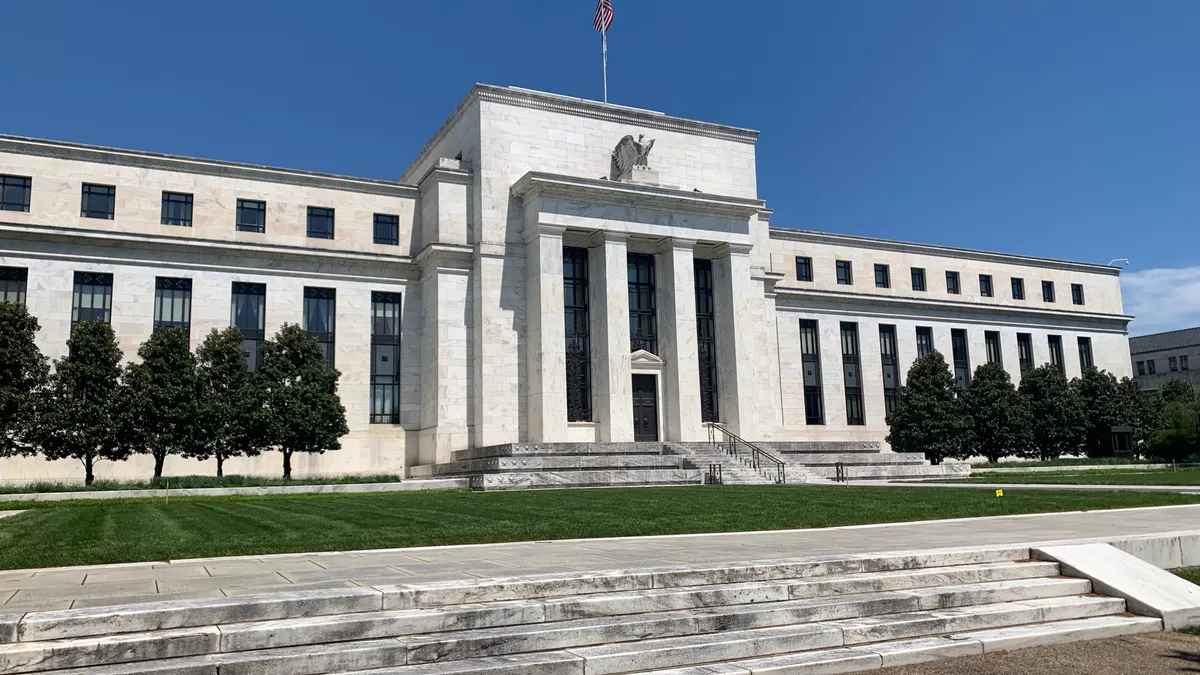Dive Brief:
- The Senate, by a 51-50 vote Tuesday, confirmed Michigan State University economist Lisa Cook to the Federal Reserve Board of Governors, making her the first Black woman to serve on the seven-seat panel.
- Cook, whose term expires in January 2024, garnered no Republican support, and Democrats needed Vice President Kamala Harris to cast a tie-breaking vote Tuesday.
- Cook is the second of President Joe Biden’s central bank nominees to be confirmed. The Senate last month approved elevating Lael Brainard to Fed vice chair by a 52-43 vote. Votes on Davidson College economist Philip Jefferson and the renomination of Fed Chair Jerome Powell could come this week, according to The Wall Street Journal. Little opposition is expected for either nominee. Jefferson in March received unanimous support from the 24-member Senate Banking Committee, and only one senator — Elizabeth Warren, D-MA — objected to a second term for Powell.
Dive Insight:
Cook’s confirmation adds a fifth governor to the Fed’s board, leaving two open roles: the seat for which Jefferson is nominated, and the open slot for the vice chair of supervision. Biden has nominated Michael Barr for that position, but the Senate Banking Committee has yet to hold a hearing for him.
Democrats had planned to vote on Cook’s nomination late last month — directly after the Brainard vote — but asked Republicans to delay the tally after Harris and two senators tested positive for COVID-19, making it unlikely Democrats would have enough support to confirm Cook.
Republicans refused, forcing a 51-47 vote against Cook’s nomination. However, Senate Majority Leader Chuck Schumer, D-NY, filed a motion to reconsider the nomination at a later date.
Sen. Sherrod Brown, D-OH, the banking panel's chair, said Cook would “bring an invaluable perspective while implementing the Federal Reserve’s dual mandate and protecting its independence.”
The dual mandate refers to the central bank’s mission to support maximum employment while keeping prices stable. The latter notion, though, has seen much debate given inflation in recent months. The Fed approved a half-percentage-point interest rate increase last week — the second bump in two months — and indicated two further upward adjustments were likely in June and July.
“Addressing inflation remains a top priority of the Biden-Harris administration, as we work to lower costs for hardworking families," a White House official told CNBC on Tuesday. "It is important to have a fully-staffed Federal Reserve who can take on these challenges for the American people.”
Sen. Pat Toomey, R-PA, the ranking member of the banking panel, took issue Tuesday with Democrats correlating the Fed’s monetary policy moves with its staffing level.
“If confirming Fed nominees is so important in the fight against inflation, this Democrat strategy of canceling votes begs the question: Why wait? Why wait to confirm Powell and Jefferson?” Toomey said Tuesday. “Democrats know that Professor Cook is grossly unqualified to serve on the Fed. And they don’t want to leave her stranded as the final Fed nominee to seek confirmation. And so they are holding the nominations of Powell and Jefferson hostage in order to push through their preferred candidate.”
At her nomination hearing in February, some Republicans challenged Cook’s experience level with monetary policy. Sen. Bill Hagerty, R-TN, for one, said Cook’s academic background — with its emphasis on the cost of racial disparities — “doesn’t seem related to the mission of the Federal Reserve.”
Cook, during the hearing, called high inflation “a grave threat to a long, sustained expansion, which we know raises the standard of living for all Americans and leads to broad-based, shared prosperity,” and pledged committed to keep inflation “well anchored.”
In his statement Tuesday, Toomey said the Senate risked installing an “inflation dove” by confirming a nominee whose views on inflation lacked details.
Cook and the Fed’s other potential new faces, however, likely won’t deviate from the board’s consensus on monetary policy, Tim Duy, chief U.S. economist at SGH Macro Advisors, told The Wall Street Journal.
“The new additions will likely adapt more to the existing institution rather than vice versa,” he said.
Toomey accused Democrats of using Cook as a vehicle to advance “extreme left-wing political advocacy” on issues such as climate change and social justice within “historically independent” regulatory bodies.
At a separate event Tuesday, Fed Gov. Christopher Waller appeared to reinforce Toomey's view that climate change policy is the domain of elected officials. Waller told the Economic Club of Minnesota on Tuesday it was “Congress’s job” to determine what role environmental, social and governance standards play in regulations and reporting requirements, according to American Banker.
The Fed should focus its efforts on the outcome of shocks, not their causes, said Waller, a Trump-era Fed appointee.
“We give you an economic scenario, unemployment goes to 10%, housing prices collapse 30%. We don't say why, we just say that's the data, deal with it,” he said. “Somehow now, with climate change, we're giving a specific cause and saying, ‘OK, how are you going to deal with that specific cause?’ That’s a very different exercise.”











